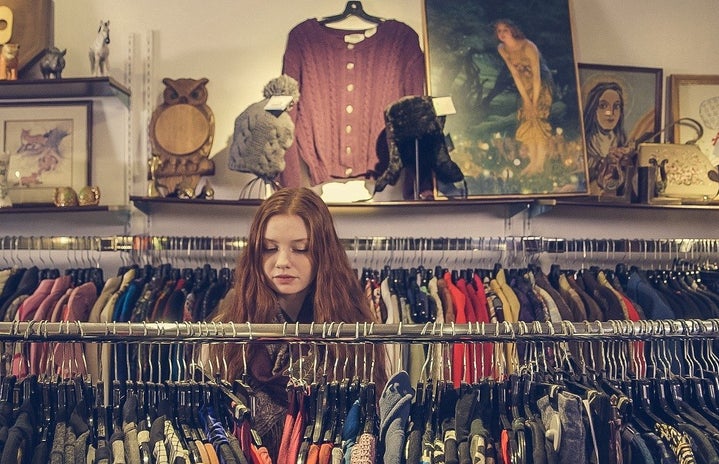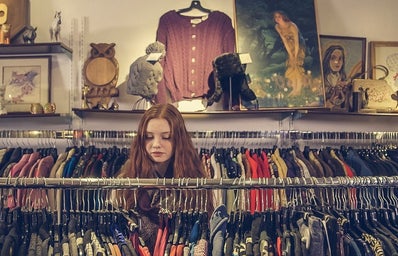In light of Her Campus at Oglethorpe’s Earth Week themed articles, it would be remiss of me not to talk about the elephant in the room when it comes to sustainability culture, climate change, and making ethical purchases: eco-ableism, and related to this––the privilege of boycotting. While I am not disabled myself (and I have never claimed to be), ever since recovering from COVID-19, I am definitely not as able-bodied as I used to be, and with that awareness comes some lifestyle changes.
Sustainability culture, first and foremost, is a privilege that not many people can afford to take part in. Many sustainable and ethically produced products have prices that reflect these values, and while many people wish to participate and support such businesses, not everyone has the spare income or time to think about where their items come from or search for the best and most responsible options.
Sustainability is directly related to the issue of fast fashion, in which accessibility plays a huge role in whether or not people can simply boycott companies. As a mid/plus-size woman, I can normally fit into the larger end of straight sizes. However, these sizes are often more expensive or not as cute, so I end up having to settle or just not shop for new clothes. In addition, I also struggle heavily with body dysmorphia and being the victim of microaggressions from shop workers for my size, so I avoid clothes shopping in general, even when I actually need new clothes. Shopping online is a nightmare because even if my size is available, there’s always the issue of risking an ill-fitting buy.
Thrifting is also a privilege and a trend that has been significantly gentrified by straight-sized bodies. Often, Rich white people will flock to thrift stores to revamp or even resell their clothing for jacked up prices, leaving nothing for the people who can only afford to shop there. Additionally, not everyone is close to a thrift store or a similar donation site. And again, as a not-straight-sized person, I might not even find anything for me at a thrift store.
This is not to say that I’m not aware of the horrendous practices of fast fashion companies (labor violations, horrible customer service, unethically sourced and disposed materials), but I cannot realistically cut such companies out of my life. If I could find clothes (even secondhand) that fit me and my lifestyle, I would automatically make the switch.
Therein lies the root of eco-ableism: the fact that many single-use plastic products are impossible to be substituted out for those with disabilities. Many older people need plastic pill containers, for example, to help sort their medications. People with motor issues need plastic straws to drink without assistance, and do not have the ability to wash reusable ones. Additionally, disabled people often need access to their specially modified cars to be able to transport themselves because walking or public transportation is out of the question, and that can leave them out of getting more gas-efficient hybrid cars (which many countries have tax incentives for owning). Those who are incontinent need access to disposable underwear and sanitary pads. Even those ‘As seen on TV’ products that are made for disabled people to help them in their daily lives are shamed for being lazy shortcuts or overly wasteful.
This merely scratches the surface on a myriad of issues facing the disabled community, including the effects of climate change related natural disasters on disabled people. Much of the disabled population have to simply ride out storms because they are unable to evacuate, and power outages for them can also be deadly.
In short, trying to shame others into boycotting or changing their lifestyle is ableist and classist, and I would encourage everyone to instead just make the best decisions for their personal lives without worrying about what other people are doing. Everyone’s personal struggles differ, so instead of adding to that, attempt to do what one can for themselves. Further, recognize that sometimes, individual people are not the ones we need to be focusing on, but rather the larger corporation and governments that made this sort of lifestyle necessary in the first place.
Additional resources on Eco-Ableism can be found here:
Disability activist Elizabeth Wright writes about her experiences: https://uxdesign.cc/climate-change-disability-and-eco-ableism-why-we-need-to-be-inclusive-when-trying-to-save-the-88bb61e82e4e
Inspirational speaker/comedian/writer Ally Bruener’s experiences: https://www.euronews.com/living/2021/03/13/why-its-hard-to-live-sustainably-as-a-disabled-person
Defend Our Future Campus Ambassador Emily Johnson: https://defendourfuture.org/increasing-inclusivity-of-disabled-voices-in-the-environmental-movement/
George Washington University’s Milken Institute School of Public Health: https://onlinepublichealth.gwu.edu/resources/straws-plastics-disability-sustainability/
YouTuber Sarah Hawkinson recognizes the privilege of boycotting fast fashion: https://www.youtube.com/watch?v=c2DeQy_ej44&t=70s



